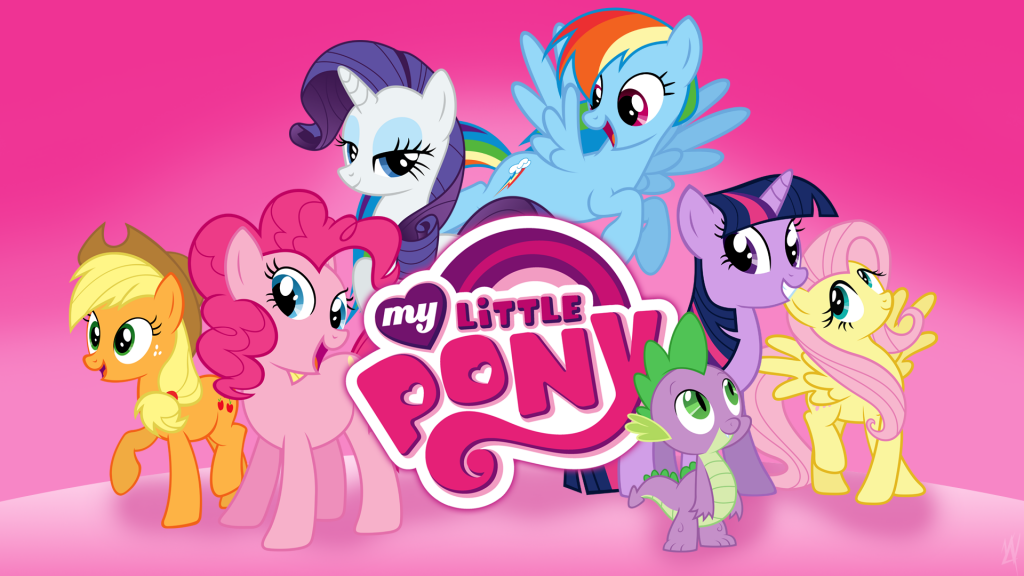 |
| MyLittleVisuals |
Once upon a time, in the magical land of Canada, there were two regal sisters who watched My Little Pony: Friendship is Magic
together. One day, while watching the antics of one Twilight Sparkle,
who was having panic attacks over the prospect of not getting her weekly
assignment in on time, the younger sister turned to the older and said,
“Wow, she’s you.”
It’s
not easy to admit that you over-identify with a purple cartoon unicorn,
but when the character in question is Twilight Sparkle, it does get a
little easier. Twilight is the main character of Lauren Faust’s somewhat
new, very much improved remake of the classic My Little Pony
television show. In this version, Twilight is introduced as the student
of Princess Celestia, a sort of living god who nevertheless takes time
to train young unicorns in the art of magic. The first time we meet her,
Twilight is reading about the history of Equestria; the next time we
see her, she is literally running away from the idea of socializing with
her fellow students in order to do research on her break. Certain that
her research indicates an impending danger to all of Equestria, she
alerts Princess Celestia, who basically tells her to lay off the
studying and go outside.
In
this case, “outside” means the town of Ponyville, where Twilight will
be ensuring that the Summer Sun Celebration goes off without a hitch.
During preparations, she encounters five ponies who want to become her
friend; for the most part, she seems to consider friendship as desirable
as the flu. Still, when it comes time to defeat Nightmare Moon using
the Elements of Harmony, Twilight finds that their friendship is
literally magical. Working together, they save Equestria from eternal
night and restore Nightmare Moon to her former self, Princess Luna. By
the end of the episode, Twilight has come to treasure her new friends
and gladly accepts Celestia’s mission to stay on in Ponyville and learn
the lessons of friendship.
I
will readily admit that any description of the show’s general premise
is unlikely to entice adults to watch it. (Also less than appealing are
the antics of the infamous Bronies, but I digress...) You would think
that there would be a limited audience for a show that basically boils
down to “talking horses solve problems using the magic of friendship and
Sondheim-inspired musical numbers.” What makes the show, for me, is its
focus on positive relationships between female characters with diverse
personalities. While shows that only feature one or two female
characters often end up painting all girls and women with the same broad
strokes, MLP:FiM can address issues both universal and specific to one of a wide range of personality types.
One
of these is the antisocial bookworm, represented by Twilight Sparkle.
Some critics have claimed that Twilight’s arc is anti-intellectual,
placing higher value on social skills than knowledge. In fact, the show
handles this issue quite deftly, as evidenced by its emphasis on the
“lessons” that Twilight and her friends must learn; Twilight must
increase her knowledge, becoming “people-smart” in addition to
“book-smart”. The two kinds of intelligence are complementary, and both
are necessary to obtain. Twilight also maintains her studious nature,
regularly reading and working into the night. On many occasions,
research plays a major part in solving problems and the other ponies
quite regularly look to Twilight for guidance simply because she knows
so much.
It’s
an empowering message, especially when considered in combination with a
lesson that Twilight learns in the first season. When the arrogant
Trixie rolls into Ponyville, proclaiming herself the greatest magician
in the world, the other ponies bristle at her boasting. Twilight
hesitates to challenge this assertion, fearing that the townspeople will
find her similarly grating. After she manages to save the town using
her powers, however, her friends assure her that she should be proud of
her abilities. Being proud isn’t a problem, but being a braggadocio is.
Women and girls are often encouraged to be overly modest, so it’s nice
to see a show telling girls that it’s okay to let people know you’re
awesome.
The
flip side of knowing you’re awesome is living up to that awesomeness,
and this is a problem with which Twilight struggles on numerous
occasions. The two most interesting examples occur in “It’s About Time”
and “Lesson Zero”, which deal with Twilight’s attempts to meet the
impossible standards she sets for herself.
“It’s
About Time” begins with Twilight having a meltdown over a problem of
planning, namely that she forgot to allot time for making next month’s
schedule in the current one. Already convinced that her oversight will
mess up her entire year, she is completely thrown by the appearance of
her future self, rocking a dystopian style complete with eyepatch.
Twilight’s insatiable curiosity drives her to ask her future self all
about how she got there, leaving no time for the why. Twilight is left
to try to prevent some unknown disaster, and she spends days working on
the problem. Eventually, she comes to the conclusion that “doing things
didn’t work, not doing things didn’t work, and [she] couldn’t predict
the future either. So [she] only had one other choice: monitor everything.” When no disaster occurs, Twilight realizes that her future (now present) self was trying to tell her not to worry.
“Lesson
Zero” tells a similar story, as Twilight, who adds tasks to checklists
like “triple check the checklist to make sure we didn’t miss anything
when we double-checked the checklist,” realizes that she has failed to
learn her weekly lesson of friendship. Frantic to report back to
Celestia in time, she eventually creates a problem for herself to fix.
She quickly loses control of the situation, and Celestia arrives in all
her deus ex machina glory to set things right. The lesson for this
episode is a two-for-one: Twilight needs to learn not to sweat the small
stuff, and her friends have to understand that what they see as small
stuff is actually of major concern to Twilight. Her worst fear is
failure, and the high expectations she has for herself mean that failure
of any kind can be crushing.
What
I find interesting about Twilight Sparkle is that the only person who
can successfully defeat her is herself. A lunar goddess wants to shroud
the world in eternal night? No problem. The living incarnation of chaos
terrorizes Equestria and distorts her friends almost beyond recognition?
She can handle that. An ancient evil that imprisoned an empire for
centuries seeks to spread hatred and fear across the land? Let’s do this
thing. But the moment she’s faced with the prospect of a missed
assignment, she becomes the only villain she can’t vanquish.
It
is only when Twilight learns to accept failure that we begin to see
where her character arc is going. Celestia gives her the task of saving
the Crystal Empire, with the condition that she must do it on her own.
With time running out, a trapped Twilight entrusts Spike with the task,
knowing that, by doing so, she will fail the test. Luckily, the lesson
of the week turns out to be self-sacrifice for the greater good, so she
actually passes by failing. In this episode, we get our first indication
that there is more behind Twilight’s journey than the education of a
single unicorn; here, we get the first whisperings of destiny.
In
the final episode of the third season, this destiny is fulfilled. The
journey that began with a teacher’s insistence that her student should
go outside and smell the roses becomes the story of Twilight Sparkle’s
apotheosis. In using the power of friendship to finish a spell that
eluded the great Starswirl the Bearded, Twilight proves herself worthy
of becoming an Alicorn, a creature that combines the traits of unicorns,
pegasi, and earth ponies. She also, notably, gains the title of
“princess”.
We’ve talked a lot about princesses on this blog, and I have to say that I prefer the My Little Pony
conceptualization of princesses to most other versions. Disney
princesses are usually pretty excellent people, but they don’t become
royalty because of their positive qualities. Instead, they gain their
crowns either through birth or marriage, though I suppose an argument
could be made that Mulan earned her “Disney princess” title through
sheer badassery. By contrast, My Little Pony
makes its princesses earn their crowns. Celestia explicitly states that
Twilight has demonstrated the charity, compassion, devotion, integrity,
optimism, and leadership of a true princess. Her immense magical
ability, in combination with the power of the friendships she’s formed,
allows her to create new magic, and this seems to be a prerequisite for
achieving princess status. Even after securing the title, Twilight must
live up to it. The citizens of Equestria are now Twilight’s students,
and she will serve as an inspiration to them, and to all of the geeky,
introverted, anxiety-ridden perfectionists in the audience.
Verdict: Actual strong female character
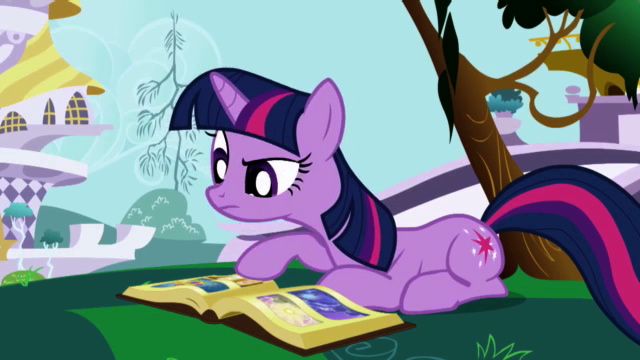
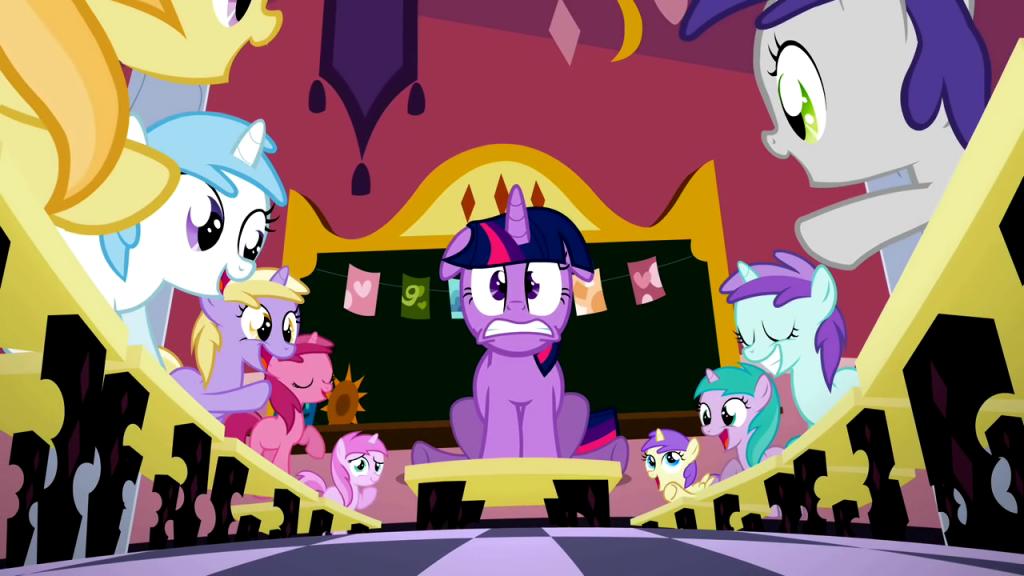
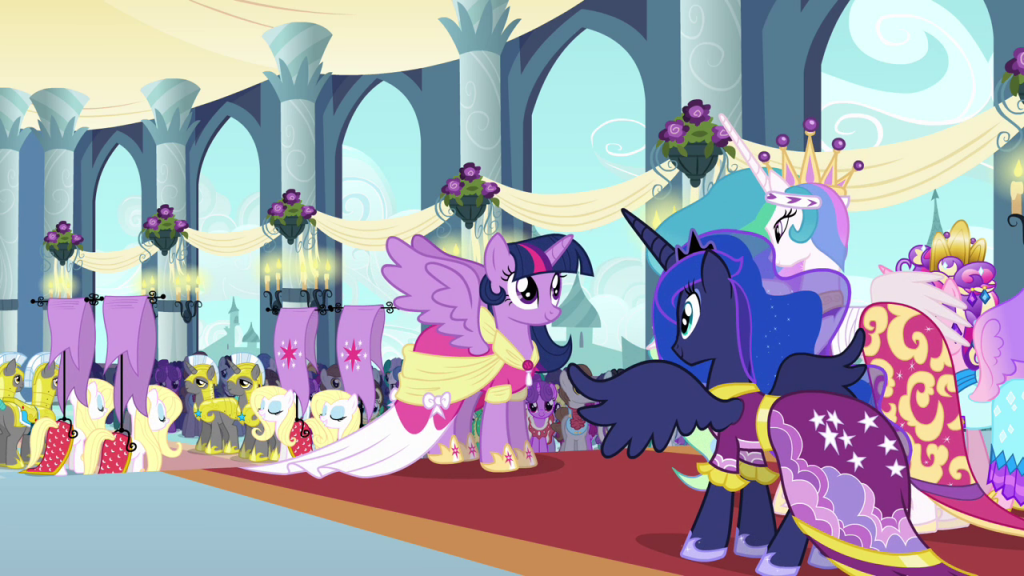
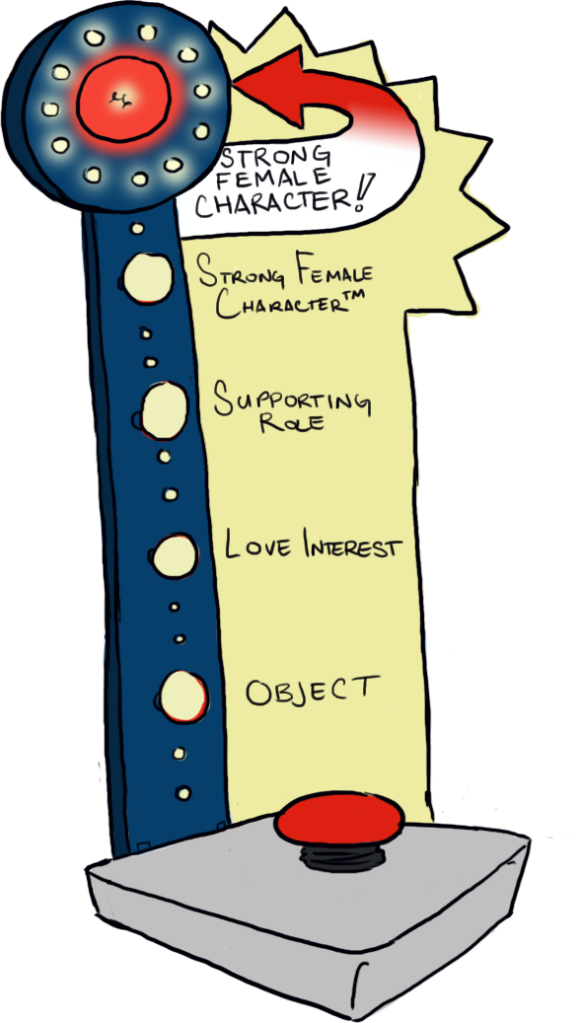
No comments:
Post a Comment